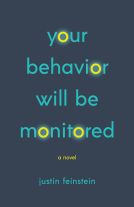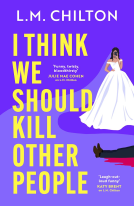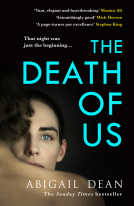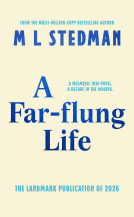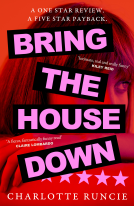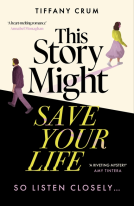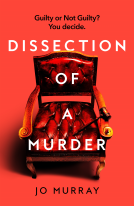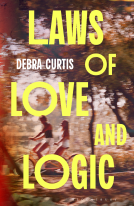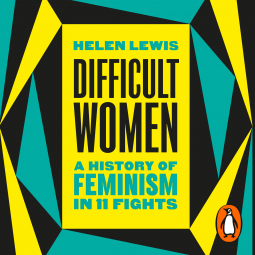
Difficult Women
A History of Feminism in 11 Fights (The Sunday Times Bestseller)
by Helen Lewis
Narrated by Helen Lewis
This title was previously available on NetGalley and is now archived.
Send NetGalley books directly to your Kindle or Kindle app
1
To read on a Kindle or Kindle app, please add kindle@netgalley.com as an approved email address to receive files in your Amazon account. Click here for step-by-step instructions.
2
Also find your Kindle email address within your Amazon account, and enter it here.
Pub Date 27 Feb 2020 | Archive Date 26 Feb 2021
Penguin Random House UK Audio | Vintage Digital
Talking about this book? Use #DifficultWomen #NetGalley. More hashtag tips!
Description
Brought to you by Penguin.
Well-behaved women don’t make history: difficult women do.
Helen Lewis argues that feminism’s success is down to complicated, contradictory, imperfect women, who fought each other as well as fighting for equal rights. Too many of these pioneers have been whitewashed or forgotten in our modern search for feel-good, inspirational heroines. It’s time to reclaim the history of feminism as a history of difficult women.
In this book, you’ll meet the working-class suffragettes who advocated bombings and arson; the princess who discovered why so many women were having bad sex; the pioneer of the refuge movement who became a men’s rights activist; the ‘striker in a sari’ who terrified Margaret Thatcher; the wronged Victorian wife who definitely wasn’t sleeping with the prime minister; and the lesbian politician who outraged the country. Taking the story up to the present with the twenty-first-century campaign for abortion services, Helen Lewis reveals the unvarnished – and unfinished – history of women’s rights.
Drawing on archival research and interviews, Difficult Women is a funny, fearless and sometimes shocking narrative history, which shows why the feminist movement has succeeded – and what it should do next. The battle is difficult, and we must be difficult too.
© Helen Lewis 2020 (P) Penguin Audio 2020
Advance Praise
** A BBC Radio 4 Book of the Week**
** A Sunday Times bestseller**
'All the history you need to understand why you're so furious, angry and still hopeful about being a woman now' Caitlin Moran
'This is the antidote to saccharine you-go-girl fluff. Effortlessly erudite and funny' Caroline Criado-Perez
'Compulsive, rigorous, unforgettable, hilarious and devastating' Hadley Freeman
Available Editions
| EDITION | Other Format, Unabridged |
| ISBN | 9781473578036 |
| PRICE | £10.83 (GBP) |
| DURATION | 9 Hours, 42 Minutes |
Links
Average rating from 25 members
Featured Reviews
 Reviewer 406780
Reviewer 406780
Feminism isn't a single idea, and is interpreted differently by every individual and their experiences. 'Difficult Women' never professes to be the definitive guide to what feminism is, but rather it is a book that is just one interpretation and one voice. However, what it does do is link a number of historical battles and difficult women together, distilled into 11 categories spill into the modern feminist era. I took a lot away from from this. From the different women that are given a fresh voice, to hearing how each of them define how they view feminism or their fight for equality was incredibly facinating. None of these women are perfect, all are difficult, and all of them are complicated individuals.
Some of these women included Annie Kenny, who was deeply involved in the Suffragette movement. Exasperated at lack of movement towards women's votes, she moved towards more extreme forms of activism in a heavily male dominated legal system. Any woman who fought for these rights was played down, brushed off as unimportant. Helen Lewis really helped bring to life what Annie Kenny was a person, a working class woman who just wanted to have what men had, and has somehow been left to fall into obscurity because she never fitted the Suffragette narrative of this upper class, well spoken woman.
There's also Marie Stopes, who was one for the first to grant access to birth control to desperate women. Her clinics granted women a degree of sexual liberation they'd never seen before, yet she was also incredibly snobbish, conservative, anti semetic and anti lesbian. She believed in eugenics and was also vehemently against abortion. Difficult women are not perfect, and sometimes their agenda, although good for the masses, is undertaken for selfish and flawed reasons.
The chapter of time was perhaps the most personal for me. It talks of the divergence of pay between men and women in their 30s, as women move to part time and unskilled work in order to take on the role of motherhood and child carer as this is what society has come to expect of women. Women as a result have less downtime, and less free time in general compared to their male counterparts because society often makes us feel guilty into doing the majority of the housework and organising. Our time never seems to be our own, and this rang so true for myself as a mother.
Interesting deep dive into some facinating 'difficult women' that helps open the doors into further research on feminism and equal rights.
This is a rich text, from which I learned a great deal. Lewis tells the stories of a number of women of whom I had never heard. The book is, overall, a good introduction to the systemic nature of the patriarchy (in the UK, at least) and a demonstration of how it remains embedded in today's social structures. I like the premise of 'Difficult Women': that we need to avoid flattening histories or "cancelling" pioneers in our understanding of feminist progress. Indeed, to do so plays into the anti-feminist idea that women must be perfect, quiet and, crucially, not difficult. There are elements of Lewis' feminism with which I disagree and these often appear in those (few) moments where her voice feels louder than others. Mostly Lewis is good at passing the mic and presenting key issues as open-ended debate. She is both pragmatic and forceful in her prose, and I think that the full breadth of her personality comes through in her narration of the audiobook.
Genre: Non-Fiction
Release Date: 27th February 2020
When you hear the word 'fight' what do you see? Men, probably. Well this book is here to change your outlook. The fight for feminism was paved with women who weren't afraid to be everything they've been told not to be - vulgar, loud, outspoken, difficult and completely inspiring.
But what does difficult mean? The dictionary would say "A person not easy to please or satisfy; awkward." But here, difficult means proud, it means independent, it means a woman who is willing to fight for her rights and won't be defined by the roles given to her by men.
In this book you'll meet eleven such women, from lesbian politicians, riot starters, the women who finally started to demand good sex, and one who was obviously not sleeping with the prime minister... depending on who you ask.
Helen Lewis gives a fresh and unconventional history of feminism in it's raw, uncensored and unequivocally unfinished glory. Drawing back to the sparks that started the fire in all of us right up to the battles we are still fighting in today - this book gives an amazing and in depth overview of the untold history of women that won't fail to inspire and empower.
RATING: ⭐⭐⭐⭐⭐
Thank you to Helen Lewis and NetGalley for an ARC in return for an honest review.
 Reviewer 542721
Reviewer 542721
I absolutely loved this audiobook, it was really thought provoking highlighted how patriarchy is still embedded in our society and social structures.
There were some women mentioned in this book that I hadn't even heard of before.
 Laura D, Reviewer
Laura D, Reviewer
This was a fab audiobook. It was fascinating to hear about the difficult women who have challenged the world to shape the experiences of us women in certain areas. The audiobook being read by the author sounds like a longer more in depth podcast. Would definitely recommend!
Difficult Women is a well researched
introduction to feminism and some of the interesting women who have been involved in the fight for equality.
The book is divided into 11 chapters, each one exploring an issue in feminism and focusing on a handful of the key women involved. Some of the women are generally well known whilst others were certainly new to me. Lewis does well to walk the line between celebrating them while also mentioning their flaws and critically discussing their approaches. It was particularly insightful to hear from the women themselves, on several occasions Lewis has made contact with those surviving and reports on their own reflections. As most people are, these women are complex and this book reflects that.
There are limitations to this book but feminism is so wide reaching and complex that it’s difficult to condense it into one book. ‘Difficult Women’ is very UK-centric and while they’re mentioned, race and gender identity don’t play a large part. Lewis at least recognises these shortfalls at the start of the book. These issues are also mentioned throughout the book and not just forgotten and Lewis may not be best placed to discuss them anyway. Overall, the book is structured well with the 11 chosen issues covering plenty of ground. It also remains very accessible and engaging throughout which is essential for ensuring it reaches as many people as possible.
I listened to the audiobook which was read by the author herself. This worked well as the Lewis includes plenty of her own thoughts and experiences.
Thank you to Netgalley and the publishers for a copy of this book in exchange for an honest review.
Title: Difficult Women
A History of Feminism in 11 Fights
by :Helen Lewis
Narrated by: Helen Lewis
Publishers:Penguin Random House UK Audio
Genre: Vintage
Review on Goodreads: https://www.goodreads.com/review/show/3754853814
In this book Lewis looks at women who are considered feminists. However, Lewis wants people, especially feminists to see these woman as whole. She wants people to stop making saints of these woman.
For example Lewis tells us about coco Chanel and how she was connected to the Nazi's but in modern times this is over looked and instead feminists focus on how she was a savvy business woman.
Lewis speaks about all types of feminists. This includes the suffragettes who turned to violence to get there point across and she quoted Chimamanda Ngozi Adichie who is a known TERF. (Feminists who don;t support transwomen)
The book shared a wealth of information, woman's rights from other countries and what women in those countries still face.
I found out a lot more not only about myself but about each of the feminist waves. Lewis states at the end of her book that while she may not agree with all of the actions that have happened during the feminist waves and my not agree with each and every feminist and their views that it is important to see these women and feminists.
Unfortunately I disagree. Yes there are many types of feminist but some cause damage to the movement. Personally I am an international feminist (are we not here to rep all woman after all) who includes Transwoman in that statement. I do not associate myself for TERF's. Here Lewis and I disagree.
I don't often listen to audio books so there are somethings I must let slide. It annoyed my when I thought Lewis was speaking for her self and it would turn out to be a quote. As for Lewis being the narrator I thought she did a good job, sometimes funny or sarcastic tone broke up the stream of information.
"Difficult" was the right word to pick. Of course women had to be difficult to get their rights. However, I personally do not consider those who fought/fight for the rights of a few women, or women like them to be true feminists. I also feel that true feminist's support men when it is needed. Support them when they are the victims. I was glad to see Lewis had not over looked this form of feminism.
As an Irish, disabled female feminist I was proud to see the Irish vote to amend the 8th was also included in this book.
After reading/listening to the whole book I have added a star. Who knew how much I would like Lewis's work. This is the kind of book I would give a fellow feminist or a person who calmed "But men and women are equal now" So probably everyone.
This was a fantastic audiobook! I love it when authors narrate their work, because you can hear the emotion and passion that the author has for the subject. Helen Lewis was very engaging and captivating whilst performing, and the humour really come out well too! Highly highly recommend!
This was an interesting listen. I learned a lot about women I have heard of before, and some I have never heard of. I enjoyed how the book is organised, with each chapter covering a topic or fight (including Time, Sex, and Work). Working in employment advice, the section on Work was particularly interesting, as was the discussion around Time and how motherhood and household work are a massive drain on time resources, yet unpaid.
I also appreciated Lewis approaching the subject of women feeling it difficult to express their feminist ideals when the people they love are those they are pointing out as benefiting from their oppression. This is a difficulty I have often thought about but never heard spoken about before. Lewis interweaves viewpoints of women and men she has spoken to in order to provide a variety of insights and arguments throughout.
The narration was well done and easy to listen to. Would recommend.
Received through NetGalley for an honest review - and thank god I got it!
"Feminism should be less concerned with individual choices than the conditions in which they were made."
I really enjoyed this non-fiction feminism book & manifesto at the end. I actually had tears in my eyes at the end because it made me quite emotional. This is an easy to read, well researched, informative book that covers all waves of feminism and some lesser known "difficult" feminists. A lot of this information is available elsewhere (Invisible Women), but I enjoyed Helen's personal insights into the issues, and her focus on the not-so-perfect feminists that we sometimes ignore or "cancel".
Her ideas about feminism as a whole made the book stand out for me. She questioned the third wave a lot, which I sometimes found quite contradictory, but I enjoyed this a lot. One of her key arguments throughout the whole book is that feminists argue too much between ourselves about being the "perfect" feminist and that the third wave is trying to make feminism quite homogenous. However, she points out that feminism is trying to represent the views of approx 3.5 billion people and therefore, how can there be one feminism?
Feminists are too hard on ourselves and on others. We're all fighting for one cause; equality! So why do we make it so difficult for other women (and men and others of course) to just do this in their own way, instead of focussing on perfection in feminism?
"This is something which often happens to women who challenge the status quo: any whisper of personal privilege is used to paint their concerns as piffling, a sideshow to other, greater oppressions. OK, OK, some women have a rough time, runs the patronising logic, but what do these ones have to complain about?"
On a very personal note, the chapter titled "violence" was the most hard-hitting for me. The night I read this chapter, I had witnessed domestic abuse in my street. I had just spoken to the police and given my statement, tucked myself into bed, and opened this book to find it was the violence chapter - I couldn't believe it. I sat for a few minutes thinking... this book isn't just statistics and data, it is REAL! All of this book describes real women's lives and struggles for the fight against the patriarchy.
This book made me angry that we have to sum up all the issues across the world that women face in 11 chapters to make it digestible. It made me angry for all the times I've fought against people who don't believe that women face discrimination. It made me sad for all the women that can't abort babies that they're rapists gave them, for the women that take abuse at home because they have no option to leave, for the women that get put in freezing huts every time they bleed, for the women that get casual sexual harassment from their boss.
We need to keep fighting, the war against the patriarchy is not over!
"To me, patriarchy is a system where men control most of the power and money, and use that control to their own advantage. It does not mean every individual man is consciously oppressing every individual woman."
 Tracy B, Reviewer
Tracy B, Reviewer
Thank you Netgalley for sending me the audio version of this book.
Helen Lewis talks us though so many strong, inspirational, pioneering women who are deemed to be “difficult” for speaking out, challenging opinions and making change over the past two centuries.
I learnt so much from this book about what these so-called difficult women have done not only for getting the vote, but for women’s football, women’s employment rights, access to higher education, rights for LBTQ, abortion, birth control, divorce, the list just goes on and on. Where would we be without these women who were willing to give up so much for other women. The things we don’t hear about are the sometimes illegal lengths they went too and how disgracefully they were treated for that, the force feeding in the prisons sounded absolutely unbearable!
I’m going to buy the paperback version purely to go back and read some of the stats, and also because I want to do more research. There’s “difficult women” we have heard of many times Emmeline Pankhurst, Rosa Parkes but there’s women in here that did so much that I had never heard of; Marie Stopes, Lily Parr, Annie Kenney, Jayaben Desai to name a few.
Lewis also covers more current topics of debate such as the battle between mothers trying to work, look after the children and the home and talks about the “2nd shift” that we start at home once we finish work. She also mentions a stat that was published in the New York Times that says college educated parents now spend double the time interacting with their kids than in the 1980’s because of helicopter parenting - constantly hovering over them rather than letting them run freely in the neighbourhoods. I honestly found it all fascinating.
I really recommend that everyone reads this book to fully appreciate our history.
“Together difficult women can change the world”
Listen to the audiobook which was both enlightening, interesting and thought-provoking. Why do we not like difficult women and why do we have to somehow remove or hide their imperfections? This book was brilliant. I am thrilled I got to listen to it and have now ordered multiple copies to give as gifts. I learnt so much about women in history and it has really made me think about how we portray women in the future.
Readers who liked this book also liked:
L.M. Chilton
General Fiction (Adult), Humor, Mystery & Thrillers
Elizabeth Arnott
General Fiction (Adult), Historical Fiction, Mystery & Thrillers


